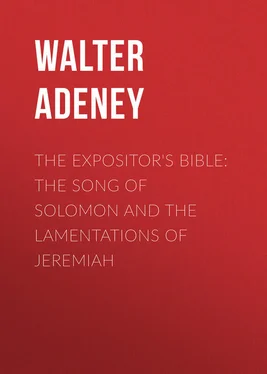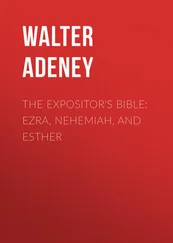Walter Adeney - The Expositor's Bible - The Song of Solomon and the Lamentations of Jeremiah
Здесь есть возможность читать онлайн «Walter Adeney - The Expositor's Bible - The Song of Solomon and the Lamentations of Jeremiah» — ознакомительный отрывок электронной книги совершенно бесплатно, а после прочтения отрывка купить полную версию. В некоторых случаях можно слушать аудио, скачать через торрент в формате fb2 и присутствует краткое содержание. Издательство: Иностранный паблик, Жанр: foreign_religion, foreign_antique, foreign_prose, на английском языке. Описание произведения, (предисловие) а так же отзывы посетителей доступны на портале библиотеки ЛибКат.
- Название:The Expositor's Bible: The Song of Solomon and the Lamentations of Jeremiah
- Автор:
- Издательство:Иностранный паблик
- Жанр:
- Год:неизвестен
- ISBN:нет данных
- Рейтинг книги:3 / 5. Голосов: 1
-
Избранное:Добавить в избранное
- Отзывы:
-
Ваша оценка:
- 60
- 1
- 2
- 3
- 4
- 5
The Expositor's Bible: The Song of Solomon and the Lamentations of Jeremiah: краткое содержание, описание и аннотация
Предлагаем к чтению аннотацию, описание, краткое содержание или предисловие (зависит от того, что написал сам автор книги «The Expositor's Bible: The Song of Solomon and the Lamentations of Jeremiah»). Если вы не нашли необходимую информацию о книге — напишите в комментариях, мы постараемся отыскать её.
The Expositor's Bible: The Song of Solomon and the Lamentations of Jeremiah — читать онлайн ознакомительный отрывок
Ниже представлен текст книги, разбитый по страницам. Система сохранения места последней прочитанной страницы, позволяет с удобством читать онлайн бесплатно книгу «The Expositor's Bible: The Song of Solomon and the Lamentations of Jeremiah», без необходимости каждый раз заново искать на чём Вы остановились. Поставьте закладку, и сможете в любой момент перейти на страницу, на которой закончили чтение.
Интервал:
Закладка:
On the other hand, several facts raise difficulties in the way of our accepting of the hypothesis of a common authorship. The verbal argument is precarious at best; it can only be fully appreciated by the specialist, and if accepted by the general reader, it must be taken on faith. Of course this last point is no valid objection to the real worth of the argument in itself; it cannot be maintained that nothing is true which may not be reduced to the level of the meanest intelligence, or the "differential calculus" would be a baseless fable. But when the specialists disagree, even the uninitiated have some excuse for holding the case to be not proved for either side; and it is thus with the resemblances and the differences between Jeremiah and Lamentations, long lists of phrases used in common being balanced with equally long lists of peculiarities found in one only of the two books in question. The strongest objection to the theory that Jeremiah was the author of the Lamentations, however, is one that can be more readily grasped. These poems are most elaborately artistic in form, not to say artificial. Now the objection which is roused by that fact is not simply due to the loose and less shapely construction of the prophecies; for it may justly be urged that the literary designs entertained by the prophet in the leisure of his later years may have led him to cultivate a style which would have been quite unsuitable for his practical preaching or for the political pamphlets he used to fling off in the heat of conflict. It originates in deeper psychological contradictions. Is it possible that the man who had shed bitterest tears, as from his very heart, in the dismal reality of misery, could play with his troubles in fanciful acrostics? Can we imagine a leading actor in the tragedy turning the events through which he had passed into materials for æsthetic treatment? Can we credit this of so intense a soul as Jeremiah? The composition of In Memoriam may be cited as an instance of the production of highly artistic poetry under the influence of keen personal sorrow. But the case is not parallel; for Tennyson was a passive mourner over the loss of a friend under circumstances with which he had no connection, while Jeremiah had contended strenuously for years on the field of action. Could a man with such a history have set himself to work up its most doleful experiences into the embroidery of a peculiarly artificial form of versification? That is the gravest difficulty. Other objections of minor weight follow. In the third elegy Jeremiah would seem to be giving more prominence to his own personality than we should have expected of the brave, unselfish prophet. In the fourth the writer appears to associate himself with those Jews who were disappointed in expecting deliverance from an Egyptian alliance, when he complains —
"Our eyes do yet fail in looking for our vain help:
In watching we have watched for a nation that could not save." 94 94 iv. 17.
Would Jeremiah, who bade the Jews bow to the scourge of Jehovah's chastisement and look for no earthly deliverer, thus confess participation in the worldly policy which he, in common with all the true prophets, had denounced as faithless and disobedient? Then, while sharing Jeremiah's condemnation of the priests and prophets, the writer appears to have only commiseration for the fate of the poor weak king Zedekiah. 95 95 iv. 20.
This is very different from Jeremiah's treatment of him. 96 96 Jer. lii. 2, 3.
It is not a serious objection that our poet says of Zion,
"Yea, her prophets find no vision from the Lord," 97 97 ii. 9.
while we know that Jeremiah had visions after the destruction of Jerusalem, 98 98 E.g. Jer. xlii. 7.
because the general condition may still have been one characterised by the silencing of the many prophets with whose oracles the Jews had been accustomed to solace themselves in view of threatened calamities; nor that he exclaims,
"Shall the priest and the prophet be slain in the sanctuary of the Lord?" 99 99 ii. 20.
although Jeremiah makes no mention of this twofold assassination, because we have no justification for the assumption that he recorded every horror of the great tragedy; nor, again, that the author is evidently familiar with the Book of Deuteronomy, and refers frequently to the "Song of Moses" in particular, for this is just what we might have expected of Jeremiah; and yet these and other similar but even less conclusive points have been brought forward as difficulties. Perhaps it is a more perplexing in view of the traditional hypothesis, that the poet appears to have made use of the writings of Ezekiel. Thus the allusion to the prophets who have "seen visions … of vanity and foolishness," 100 100 ii. 14.
points to the fuller description of these men in the writings of the prophet of the exile, where the completeness of the picture shews that the priority is with Ezekiel. 101 101 E.g. Ezek. xii. 24, xiii. 6, 7, xxii. 28.
Similarly the "perfection of beauty" ascribed to the daughter of Jerusalem in the second elegy 102 102 Lam. ii. 15.
reminds us of the similar phrase that occurs more than once in Ezekiel. 103 103 Ezek. xxvii. 3, xxviii. 12.
Still, that prophet wrote before the time to which the Lamentations introduce us, and it cannot be affirmed that Jeremiah could not have seen his writings, or would not have condescended to echo a phrase from them. A difficulty of a broader character must be felt in the fact that the poems themselves give us no hint of Jeremiah. The appearance of the five elegies in the Hagiographa without any introductory notice is a grave objection to the theory of a Jeremiah authorship. If so famous a prophet had composed them, would not this have been recorded? Even in the Septuagint, where they are associated with Jeremiah, they are not translated by the same hand as the version of the prophet's acknowledged works. It may be that none of the objections which have been adduced against the later tradition can be called final; nor when regarded in their total force do they absolutely forbid the possibility that Jeremiah was the author of the Lamentations. But then the question is not so much one of possibility as one of probability. We must remember that we are dealing with anonymous poems that make no claim upon any particular author, and that we have no pleas whatever, special or more general, on which to defend the guesses of a much later and quite uncritical age, when people cultivated a habit of attaching every shred of literature that had come down from their ancestors to some famous name.
Failing Jeremiah, it is not possible to hit upon any other known person with the least assurance. Some have followed Bunsen in his conjecture that Baruch the scribe may have been the author of the poems. Others have suggested a member of the family of Shaphan, in which Jeremiah found his most loyal friends. 104 104 See Jer. xxvi. 24, xxix. 3 ff , xl. 5.
It is much questioned whether the five elegies are the work of one man. The second, the third, and the fourth follow a slightly different alphabetical arrangement from that which is employed in the first – in reversing the order of two letters, 105 105 ע and פ.
while the internal structure of the verses in the third shews another variation – the threefold repetition of the acrostic. Then the personality of the poet emerges more distinctly in the third elegy as the centre of interest – a marked contrast to the method of the other poems. Lastly, the fifth differs from its predecessors in several respects. Its lines are shorter; it is not an acrostic; it is chiefly devoted to the insults heaped upon the Jews by their enemies; and it seems to belong to a later time, for while the four previous poems treat of the siege of Jerusalem and its accompanying troubles, this one is concerned with the subsequent state of servitude, and reflects on the ruin of the nation across some interval of time. Thus the poet cries —
Интервал:
Закладка:
Похожие книги на «The Expositor's Bible: The Song of Solomon and the Lamentations of Jeremiah»
Представляем Вашему вниманию похожие книги на «The Expositor's Bible: The Song of Solomon and the Lamentations of Jeremiah» списком для выбора. Мы отобрали схожую по названию и смыслу литературу в надежде предоставить читателям больше вариантов отыскать новые, интересные, ещё непрочитанные произведения.
Обсуждение, отзывы о книге «The Expositor's Bible: The Song of Solomon and the Lamentations of Jeremiah» и просто собственные мнения читателей. Оставьте ваши комментарии, напишите, что Вы думаете о произведении, его смысле или главных героях. Укажите что конкретно понравилось, а что нет, и почему Вы так считаете.












